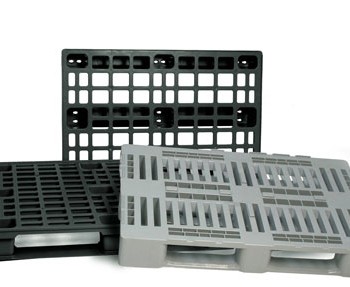Boost up your knowledge about plastic pallets
17 Jun 2014

Plastic pallets first appeared some time in the aftermath of the Second World War to help cope with material shortages. However, it is only in much more recent years that they have really begun to take off. They now make up a small but significant proportion of all pallet purchases, offering advantages for some businesses over traditional wooden alternatives.
Some of the reasons plastic pallets are being chosen by a growing number of businesses include the following.
Resistance to Chemicals
There are certain chemicals that might damage, corrode or weaken the wood of traditional pallets. When these items are being transported, especially over long distances, plastic is often the best pallet material to use. Some or all kinds of plastics may show much greater resistance to the effects of these chemicals than wood. As a result, in the event of a spillage a plastic pallet will be relatively or entirely unaffected. A wooden pallet, on the other hand, may present an immediate safety hazard or else have its total lifespan significantly reduced as a result of the spillage. However, it is important to note that even when made of plastic, not all pallets are resistant to every kind of chemical. If you are transporting this kind of substance, a reputable plastic pallets supplier will be able to provide in-depth advice on which specific kinds of pallet might be suitable.
Spill Prevention
Resistance to the effects of certain chemicals is not the only advantage that pallets made out of plastic can offer over those made out of wood in the event of a spillage. Plastic, unlike wood, is a suitable material for making containers easily and economically. This has led to pallets made from plastic and designed for preventing spillage when transporting liquids, or at least preventing that spillage from reaching the floor. These types of pallet hold barrels or other containers on top of a strong plastic grid, and then incorporate a container into the base beneath. In the event of a spillage, all or most of the liquid will be contained in this way. This generally offers much greater convenience, an easier clean-up, and significantly fewer safety hazards compared to allowing the liquid to spill on to the floor, particularly where dangerous substances are involved.
Weather Resistance
Plastic is a material that is considerably more resistant to weather than wood. As a result, wooden pallets are significantly more vulnerable than plastic ones when used in an outdoor environment. Wooden pallets will, of course, be treated to resist weather conditions, but this is effectively a fight against the natural properties of the material. Over time, particularly if the pallets are stored outdoors, rain, snow and atmospheric moisture will get through to the wood and begin to damage it. This can significantly harm the integrity of the pallet, rendering it unusable or creating a safety hazard if the damage is unnoticed. Plastic, on the other hand, is generally much more resistant to the effects of weather and moisture without the need for any specialist treatment. The result is that it provides a pallet material that will prove much more durable in the long term when used outdoors.
Practicality
Plastic provides several practical advantages over wood when used as a pallet material. It can be handled more safely than wood, because there is no risk of splintering and nails are not used in its construction. It is easily cleaned, because it is a smooth surface and unlike wood it is not at all porous. This makes it resistant to staining and unlikely to retain traces of any chemical substances it might encounter after a thorough clean. The ease with which a plastic pallet can be cleaned also makes it more suitable for use in certain environments where hygiene is an issue.
Cost
Initial purchase costs are higher than those associated with wooden pallets. This gap has been somewhat reduced over the years by improved manufacturing processes, as well as by the introduction of stricter rules over the treatment and fumigation of wooden pallets, making them more expensive to produce. Nonetheless, wooden pallets remain the cheaper option in terms of initial purchase costs. However, their plastic counterparts are more durable and, as discussed above, resistant to many of the factors that can shorten or end the life of a wooden pallet. As a result, they have a higher life expectancy than that of wooden pallets and are often more economical in the long term.
